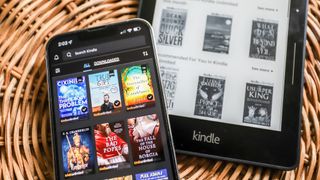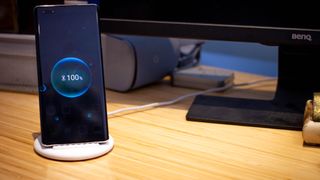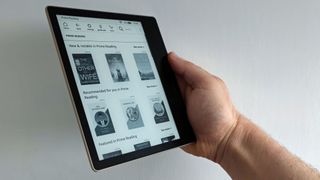Why can't premium Android phones last as long as Amazon Kindles?
We really need longer-lasting devices

As I'm packing for my much-needed vacation, I'm reminded of an issue I have with so many of the Android phones I test for TechRadar.
I'm kind of dreading having to bring my OnePlus 10T with me. This thought occurred to me while I was trying to fit in my Amazon Kindle Oasis and frankly, it makes sense.
That's because I can easily drop my Kindle into my backpack's side pocket without worrying that it's charged or having to find a last-minute spot for the charger. I trust my Kindle's battery life, which makes the decision of bringing the tab along easy and effortless.
That's not something I can say about my phone, though, nor most of the phones I've tested recently.
Battery anxiety
I, like many people I know, get battery anxiety. This is the worry that your gadget's battery won't last until the next time you're able to power it, and the concern often manifests in you drastically modifying your use patterns to make sure it lasts. This can involve not listening to music when you want to, or ignoring messages so you don't need to turn on the screen.
Battery anxiety isn't just a byproduct of tech-obsessed teens, though. Our lives revolve around our phones; we use them instead of credit cards for payments, instead of maps for navigation, and sometimes instead of keys for accessing the place you live or the vehicle you drive. Running out of battery could be catastrophic.

And if you're, say, in a foreign country on holiday, with no knowledge of geography beyond what your map app tells you and no understanding of the language beyond translation apps, then battery anxiety again is a very real and justifiable worry that you might get if your phone doesn't last a long time.
Get daily insight, inspiration and deals in your inbox
Get the hottest deals available in your inbox plus news, reviews, opinion, analysis and more from the TechRadar team.
And, nowadays, most phones just don't last a long time.
The problem with modern phones
Mobile phones are constantly coming out with worse and worse battery life.
To an extent, that's obvious: your old feature phone from the noughties, with its tiny screen and limited functionality will clearly last less than a modern phone. But there are changes that also do more damage than they're worth.
New features that smartphones boast like 5G connectivity, high refresh-rate screens, top-end processors and always-on displays are all terrible for your battery life. They make your phone burn through more data, have more elements displayed at once, use more power just to do basic tasks, and all this has a knock-on effect on your battery life.
Some of the issues can be mitigated by power-saving modes, but these are often only a partial measure to reduce the amount of battery used for everyday functions.
And with the dual trends of increasing screen sizes, but decreasing body sizes, phone companies are sacrificing big batteries in favor of more flashy specs and internals.
What makes this galling is that many of these features do very, very little. I've rarely found 5G to actually provide noticeably faster speeds than 4G, and the only real effect of having a top-end chipset over a mid-range one is that the phone gets hotter.
This is mainly an issue with top-end phones, as some budget ones have fewer features, so they last a lot longer between charges. The best ones last two days of use before you need to power them up, but these devices are few and far in between.

Kindle and smartphone
Because of all its bells and whistles, the OnePlus 10T doesn't have a great battery life - it loses power surprisingly quickly when I'm using it. It's not the only phone I've used with poor lasting power: the two phones I reviewed before it, the Google Pixel 6a and Asus Zenfone 9, were the same (especially the Pixel).
That's annoying most of the time, but as I said, I'm going on holiday. I'm meant to be relying on this device for 24 hours every day, but I already know it's not going to last that long.
I'm worried that, even if I turn on battery-saving mode, and moderate my behavior, I still won't be able to rely on the phone in a pinch.
That's the complete opposite to the Kindle - I don't need to worry about that thing at all. I can drop it in a bag and forget about it.
Now, I know what you're thinking: one is an e-reader, and the other is a smartphone. They shouldn't be comparable; they're different things.
But at the same time, they're both personal gadgets that we carry around with us. And they're both gadgets I'm bringing on my holiday, so I'm naturally going to be using both.
When you consider how long something like a Kindle, or a running watch, or even headphones last, it just doesn't make sense that smartphone makers seem content with offering us devices that don't even last a day.
In fact, it makes me miss feature phones or flip phones - they'd last ages on a single charge, so you could easily rely on them. And sure, we've gained loads of useful features like maps, cameras, and a quick internet connection since they were popular, but so many of the new features are actually rather useless in situations when you actually need a reliable device.

Tom Bedford was deputy phones editor on TechRadar until late 2022, having worked his way up from staff writer. Though he specialized in phones and tablets, he also took on other tech like electric scooters, smartwatches, fitness, mobile gaming and more. He is based in London, UK and now works for the entertainment site What To Watch.
He graduated in American Literature and Creative Writing from the University of East Anglia. Prior to working on TechRadar, he freelanced in tech, gaming and entertainment, and also spent many years working as a mixologist. He also currently works in film as a screenwriter, director and producer.
